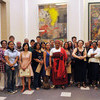‘Help us change our institution’
12 November 2019 | Story Niémah Davids. Photo Brenton Geach. Read time 4 min.
The University of Cape Town’s (UCT) Vice-Chancellor Professor Mamokgethi Phakeng, has urged the 2019 cohort of the New Academic Practitioners’ Programme (NAPP) to use their skills to help build a better and stronger university.
Established in 2004, the NAPP is hosted by UCT’s Centre for Innovation in Learning and Teaching (CILT) and is open to new full-time academics with no more than five years’ experience in the higher education sector.
As an induction programme, its key focus is to strengthen resources and practices necessary for new academics to develop as educators, researchers and members of the UCT community. The programme gives these academics an opportunity to look at and explore the curriculum through a different lens and present new, innovative methods of teaching and learning.
Addressing the academics who recently completed the programme and deans of faculties at Glenara on Monday, 11 November, Phakeng said the NAPP remains crucial to UCT, and, she noted, the 2019 collective comes at a “critical time”.
“You come to us at a time when we are dealing with issues of transformation and at a time when we are looking towards the future and also recovering from the past,” Phakeng said.
“It’s wonderful that you’ve gone through the NAPP. Your success as academics matter to us and we think it’s important that all new academics have the opportunity to participate in a programme like this one.”
Grab the opportunity
Phakeng told the recent recipients of NAPP certificates that how they choose to use the opportunities that come with the programme is what counts. After all, she added, opportunities present themselves all the time; what’s difficult is putting them to good use.
“Work with us towards achieving our Vision 2030. Help us change our institution for the better.”
“Opportunity is an interesting thing, because we all fight [for it]. Once you have an opportunity, what matters is what you do with it; that’s what will set you apart,” she said.
Phakeng encouraged the academics to get their hands dirty and to help build a better and stronger UCT.
“Work with us towards achieving our Vision 2030. Help us change our institution for the better. Grab the future rather than be thrown by the changes that are coming in this world,” Phakeng said.
Since the NAPP joins academics from UCT’s six faculties, making use of the connections and relationships built during the six months is part of taking advantage of the opportunities that come with the programme.
“You’ve made the connections; keep them going. Build those communities across departments. Let it grow as you continue your journey at our university. Let’s keep going.”
Going forward
For NAPP convenor, Dr Kasturi Behari-Leak and her team, reaching the end of the programme is always a proud moment.
Behari-Leak said in the past few months the cohort has picked up challenges in the classroom, which they’re seeking well-considered and theorised responses and approaches to.
“We’ve got to nurture this, and we’ve got to make sure that we take advantage of the opportunities in the best possible way.
“It’s not just to get ahead in [your career] or to tick boxes so [that] we can get a promotion, but [also] to make a difference in the South African higher education [sector].”
 This work is licensed under a Creative Commons Attribution-NoDerivatives 4.0 International License.
This work is licensed under a Creative Commons Attribution-NoDerivatives 4.0 International License.
Please view the republishing articles page for more information.
Centre for Higher Education Development
In the news


.jpg)



























































































































































































































